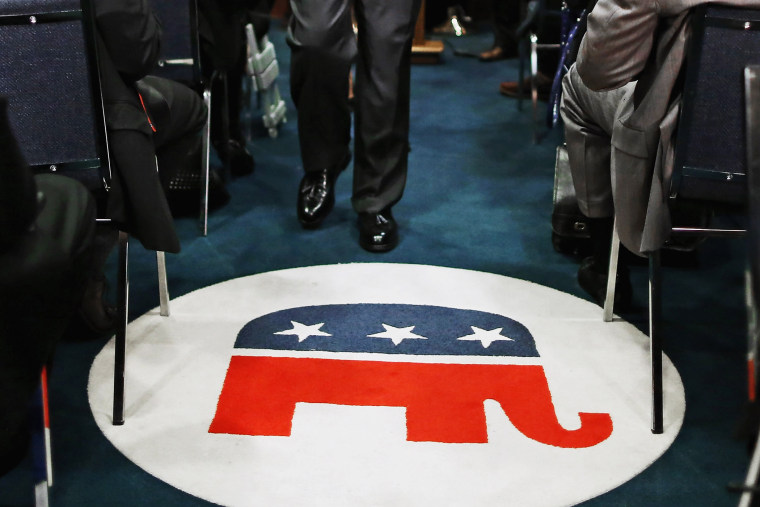Senate Majority Leader Mitch McConnell (R-Ky.) has heard many of the concerns about the state of the Republican Party, but the GOP leader told NPR yesterday that he's actually feeling quite good about the status quo.
While some of Washington's most prominent Republican leaders are still struggling over whether to endorse Donald Trump, Senate Majority Leader Mitch McConnell made the call to do so last month -- as soon as Trump became the likely nominee. In fact, for all the talk of the GOP's upheaval, the Kentucky Republican says he doesn't think a Trump nomination will redefine the Republican Party in any substantial way. The party is now at "an all-time high," he said.
That's not a paraphrase, by the way. McConnell specifically told NPR, "I think the Republican Party is at an all-time high."
By some metrics, this isn't completely crazy. Democrats may have taken some solace in the clownish, at times cringe-worthy, race for the Republican presidential nomination, but the "GOP is dead" rhetoric is wishful thinking belied by some raw numbers. Republicans currently hold most of the nation's gubernatorial offices, most of the nation's state legislatures, a majority in the U.S. House, and a majority in the U.S. Senate. The GOP hasn't seen numbers like these since the 1920s.
It's really not that surprising that Mitch McConnell is feeling pretty good.
The trouble, of course, is that the Senate Majority Leader's analysis overlooks some of the more alarming details that suggest the Republican Party's "all-time high" is a peak from which to fall, not the start of a bold far-right era.
The Pew Research Center published a striking report in April, for example, that found the GOP's public support reaching its lowest point in a quarter-century. As we talked about at the time, Republicans have lost ground with women and men; whites, blacks, and Latinos; Americans of every age group; and voters of every level of education.
This year, Republicans are likely to lose another presidential race. As things stand, the odds also suggest their U.S. Senate majority is in jeopardy, and there are even rumblings about control of the U.S. House.
Republicans have struggled for years to come up with some kind of policy agenda, but on most of the major issues of the day, the American mainstream prefers Democratic solutions.
In a country that's growing more diverse and tolerant, the contemporary GOP is increasingly dependent on an older, white voting base.
The most popular politician in America is President Obama -- whose public support is roughly triple that of the GOP-led Congress -- despite years of robust Republican efforts to destroy him.
And against this backdrop Republican voters completely ignored party leaders and handed the GOP's presidential nomination to a demagogic reality-show personality who's never served a day in public office. For all the speculation about Donald Trump's ability to win over his party's base, the fact remains that a healthy, vibrant political party in a global superpower would never have rallied behind such a candidate in the first place.
"I think the Republican Party is at an all-time high"? It's a subjective observation, I suppose, but the better question is whether Mitch McConnell will be inclined to repeat it the day after Election Day.
